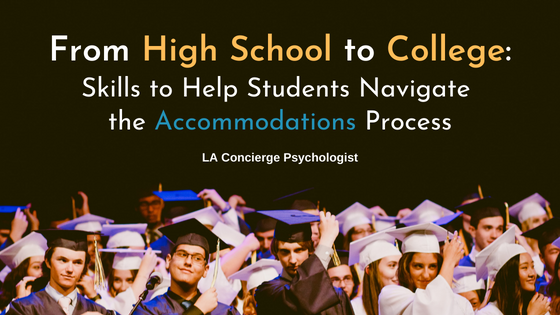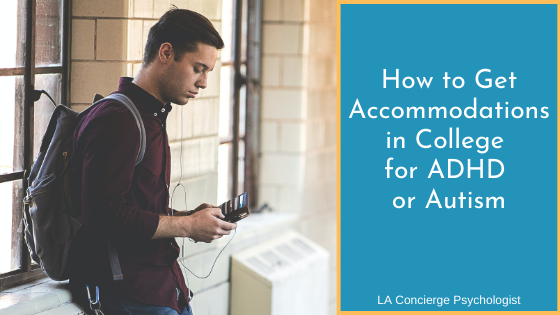The transition to college is most effective when starting in high school. If you have a child with an IEP, the transition is a little more complex. There are some additional considerations to take. To help simplify the process, I’ve broken down the college transition process into chunks. In each chunk, I’ve given ideas on what you and your teen can do to best prepare. This is a general list. So, please keep in mind that you will need to add some items tailored to your child’s unique needs.
9th and 10th Grade
- Your teen should attend and participate in their IEP meetings. They should be able to articulate their strengths and areas of support.
- Your child should develop, use, and maintain a time management system. It should be used to manage their school tasks and assignments, extra-curriculars, and home responsibilities.
- Increase your teen’s independence at home. If they haven’t started already, they should begin learning how to wake themselves up in the morning, begin learning how to feed themselves, and doing laundry.
11th and 12th Grade
- Your child’s transition IEP should be finalized, with an emphasis on college-readiness skills and becoming more independent. Your teen should increase their participation and initiation of all things related to their services.
- During the summer, your teen would benefit from participating in a part-time summer job or volunteer activities.
- If your child is applying to schools with interviews, your teen should practice interviewing skills. (more details below)
- With your and the college counselor’s support, your teen will apply to colleges. (more details below) Remember, your teen should have ownership of this process. Though tempting, don’t do things for them!
The Admissions Process
- Your teen should work with their college counselor to develop list of possible colleges. Pay special attention to student support services each college provides.
- To refine their college list, your teen should begin to research potential colleges online and visit them in-person, if possible.
- Have your teen create a system to track when applications are due, what materials are needed for each application, and when each item is completed.
- Your teen will complete application forms, request letters of recommendation, obtain high school transcripts, write personal essays, etc. There’s quite a bit to keep track of!
Interviewing
- Have your teen consult the college counselor about the typical college interview.
- Role play and practice interview skills. The non-verbal skills are just as important as the actual verbal answers.
- If your teen has any unusual speech or behavioral quirks that would stand out to the interviewer, consider preparing your teen on how to disclose their diagnosis.
- Reduce anxiety by arriving early or checking out the interview location in advance. By scoping out the location in advance, you can think of potential fixes (e.g., parking is difficult, so leaving even earlier than normal; the room is cold, so choosing an outfit that is warm).
After Receiving Acceptance Letters
- Support your teen in determining which school is the best fit for them. Try not to let your biases sway your teen (e.g., encouraging your teen to go for the name-brand school even though it doesn’t have the major your child is passionate about). If the college counselor or another neutral person who knows your child is available to help, this is very beneficial.
- Once the college is chosen, your teen should follow the procedure outlined in the letter for confirming acceptance and sending in deposit to hold their spot.
- Contact the Student Support Services office (sometimes called the office for students with disabilities, student access office, or something similar) to register with them for accommodations. This can be a tricky process, so be sure your teen knows how to secure their accommodations.
- Have your teen inquire about any open houses or orientations that might be hosted through the Student Support Services office.
- If you believe your child may need accommodations or assistance for summer orientation, help them navigate that process.
The Summer Before School Starts
- It can be really helpful to create a resource list with relevant support providers as well as on and off-campus resources (e.g., pharmacy, doctor, ATM, grocery store).
- If you believe your child may need it, contact the Student Support Services office for possible housing accommodations (e.g., needing a single, private bathroom).
- Your teen should become adept at using the school email system, online course management system, etc.
- If possible, with the help of Student Support Services, contact professors to obtain a syllabus ahead of time and to purchase books.
- If your child takes medication, support them in determining that all their medications are current, working, and a refill plan is created.
- Support your teen in establishing healthy sleep hygiene (e.g., sleep-wake cycle).
- Your teen should be nearly independent or independent with their basic daily living skills.
- Be proactive and help you college-bound kid create a plan to cope with common college stressors and situations you know overwhelm your child.
Click here for more information on College Transition and Gap Year Consultation.
Does your college-bound teen need support in successfully transitioning to college? Send us a message or book a free 20 minute consultation call with Dr. Barajas or Dr. Goldman.



